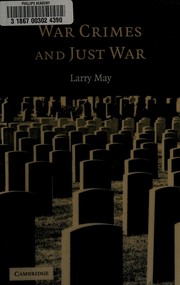Check nearby libraries
Buy this book

"War crimes are international crimes committed during armed conflict. Larry May argues that the best way to understand war crimes is as crimes against humaneness rather than as violations of justice. He shows that in a deeply pluralistic world, we need to understand the rules of war as the collective responsibility of states that send their citizens into harm's way, as the embodiment of humanity, and as the chief way for soldiers to retain a sense of honor on the battlefield. Humanitarian considerations of mercy and compassion count morally in war, even if soldiers fight with just cause and their opponents have committed atrocities. Throughout, May demonstrates that the principle of humaneness is the cornerstone of international humanitarian law and is itself the basis of the traditional principles of discrimination, necessity, and proportionality. He draws extensively on the older Just War tradition to assess recent cases from the International Criminal Tribunal for Yugoslavia as well as examples of atrocities from the archives of the International Committee of the Red Cross."--BOOK JACKET.
Check nearby libraries
Buy this book

Previews available in: English
Subjects
War (Philosophy), Nonfiction, Philosophy| Edition | Availability |
|---|---|
|
1
War Crimes and Just War
February 12, 2007, Cambridge University Press
Hardcover
in English
- 1 edition
052187114X 9780521871143
|
zzzz
|
|
2
War Crimes and Just War
February 12, 2007, Cambridge University Press
Paperback
in English
- 1 edition
0521691532 9780521691536
|
zzzz
|
| 3 |
zzzz
|
| 4 |
aaaa
|
Book Details
Table of Contents
Edition Notes
Includes bibliographical references and index.
Classifications
The Physical Object
ID Numbers
Source records
bcl_marc recordLibrary of Congress MARC record
marc_openlibraries_phillipsacademy MARC record
Internet Archive item record
Better World Books record
Better World Books record
Library of Congress MARC record
Promise Item
Internet Archive item record
marc_columbia MARC record
Promise Item
marc_nuls MARC record
harvard_bibliographic_metadata record
Better World Books record
Work Description
Larry May argues that the best way to understand war crimes is as crimes against humanness rather than as violations of justice. He shows that in a deeply pluralistic world, we need to understand the rules of war as the collective responsibility of states that send their citizens into harm's way, as the embodiment of humanity, and as the chief way for soldiers to retain a sense of honour on the battlefield. Throughout, May demonstrates that the principle of humanness is the cornerstone of international humanitarian law, and is itself the basis of the traditional principles of discrimination, necessity, and proportionality. He draws extensively on the older Just War tradition to assess recent cases from the International Tribunal for Yugoslavia as well as examples of atrocities from the archives of the International Committee of the Red Cross.
Community Reviews (0)
Feedback?History
- Created October 31, 2008
- 19 revisions
Wikipedia citation
×CloseCopy and paste this code into your Wikipedia page. Need help?
| September 17, 2024 | Edited by ImportBot | import existing book |
| August 30, 2024 | Edited by MARC Bot | import existing book |
| March 7, 2023 | Edited by MARC Bot | import existing book |
| January 14, 2023 | Edited by ImportBot | import existing book |
| October 31, 2008 | Created by ImportBot | Imported from bcl_marc record |











